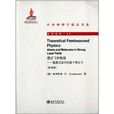基本介紹
- 書名:理論飛秒物理:強雷射場中的原子和分子
- 作者:格羅斯曼 (F.Grossmann)
- 出版社:北京大學出版社
- 頁數:214頁
- 開本:16
- 定價:39.00
- 外文名:Theoretical Femtosecond Physics: Atoms and Molecules in Strong Laser Fields
- 類型:科學與自然
- 出版日期:2013年7月1日
- 語種:簡體中文, 英語
- ISBN:9787301226872
- 品牌:北京大學出版社
基本介紹,內容簡介,作者簡介,圖書目錄,
基本介紹
內容簡介
《理論飛秒物理:強雷射場中的原子和分子(影印版)》是中外物理學精品書系之一,《理論飛秒物理:強雷射場中的原子和分子(影印版)》內容豐富,涵蓋面廣,可讀性強,其中既有對我國傳統物理學發展的梳理和總結,也有對正在蓬勃發展的物理學前沿的全面展示;既引進和介紹了世界物理學研究的發展動態,也面向國際主流領域傳播中國物理的優秀專著。可以說,“中外物理學精品書系”力圖完整呈現近現代世界和中國物理科學發展的全貌,是一部目前國內為數不多的兼具學術價值和閱讀樂趣的經典物理書。
作者簡介
作者:(德國)格羅斯曼(F.Grossmann)
圖書目錄
Part Ⅰ Prerequisites
A Short Introduction to Laser Physics
1.1 The Einstein Coefficients
1.2 Fundamentals of the Laser
1.2.1 Elementary Laser Theory
1.2.2 Realization of the Laser Principle
1.3 Pulsed Lasers
1.3.1 Frequency Comb
1.3.2 Carrier Envelope Phase
1.3.3 Husimi Representation of Laser Pulses
1.A Some Gaussian Integrals
References
2 Time-Dependent Quantum Theory
2.1 The Time-Dependent SchrSdinger Equation
2.1.1 Introduction
2.1.2 Time-Evolution Operator
2.1.3 Spectral Information
2.1.4 Analytical Solutions for Wavepackets
2.2 Analytical Approaches
2.2.1 Feynman's Path Integral
2.2.2 Semiclassical Approximation
2.2.3 Time-Dependent Perturbation Theory
2.2.4 Magnus Expansion
2.2.5 Time-Dependent Hartree Method
2.2.6 Quantum-Classical Methods
2.2.7 Floquet Theory
2.3 Numerical Methods
2.3.1 Orthogonal Basis Expansion
2.3.2 Split-Operator FFT Method
2.3.3 Alternative Methods of Time-Evolution
2.3.4 Semiclassical Initial Value Representations
2.A The Royal Road to the Path Integral
2.B Variational Calculus
2.C Stability Matrix
2.D From the HK- to the VVG-Propagator
References
Part Ⅱ Applications
Field Matter Coupling and Two-Level Systems
3.1 Light Matter Interaction
3.1.1 Minimal Coupling
3.1.2 Length Gauge
3.1.3 Kramers-Henneberger Transformation
3.1.4 Volkov Wavepacket
3.2 Analytically Solvable Two-Level Problems
3.2.1 Dipole Matrix Element
3.2.2 Rabi Oscillations Induced by a Constant Perturbation
3.2.3 Time-Dependent Perturbations
3.2.4 Exactly Solvable Time-Dependent Cases
3.A Generalized Parity Transformation
3.B Two-Level System in an Incoherent Field
References
4 Single Electron Atoms in Strong Laser Fields
4.1 The Hydrogen Atom
4.1.1 Hydrogen in Three Dimensions
4.1.2 The One-Dimensional Coulomb Problem
4.2 Field Induced Ionization
4.2.1 Tunnel Ionization
4.2.2 Multiphoton Ionization
4.2.3 ATI in the Coulomb Potential
4.2.4 Stabilization in Very Strong Fields
4.2.5 Atoms Driven by HCP
4.3 High Harmonic Generation
4.3.1 Three-Step Model
4.3.2 Odd Harmonics Rule
4.3.3 Semiclassical Explanation of the Plateau
4.3.4 Cutoff and Odd Harmonics Revisited
4.A More on Atomic Units
References
5 Molecules in Strong Laser Fields
5.1 The Molecular Ion H2+
5.1.1 Electronic Potential Energy Surfaces
5.1.2 The Morse Potential
5.2 H2+ in a Laser Field
5.2.1 Frozen Nuclei
5.2.2 Nuclei in Motion
5.3 Adiabatic and Nonadiabatic Nuclear Dynamics
5.3.1 Born-Oppenheimer Approximation
5.3.2 Dissociation in a Morse Potential
5.3.3 Coupled Potential Surfaces
5.3.4 Femtosecond Spectroscopy
5.4 Control of Molecular Dynamics
5.4.1 Control of Tunneling
5.4.2 Control of Population Transfer
5.4.3 Optimal Control Theory
5.4.4 Genetic Algorithms
5.4.5 Toward Quantum Computing with Molecules
5.A Relative and Center of Mass Coordinates for H2+
5.B Perturbation Theory for Two Coupled Surfaces
5.C Reflection Principle of Photodissociation
5.D The Undriven Double Well Problem
5.E The Quantum Mechanical Adiabatic Theorem
References
Index
A Short Introduction to Laser Physics
1.1 The Einstein Coefficients
1.2 Fundamentals of the Laser
1.2.1 Elementary Laser Theory
1.2.2 Realization of the Laser Principle
1.3 Pulsed Lasers
1.3.1 Frequency Comb
1.3.2 Carrier Envelope Phase
1.3.3 Husimi Representation of Laser Pulses
1.A Some Gaussian Integrals
References
2 Time-Dependent Quantum Theory
2.1 The Time-Dependent SchrSdinger Equation
2.1.1 Introduction
2.1.2 Time-Evolution Operator
2.1.3 Spectral Information
2.1.4 Analytical Solutions for Wavepackets
2.2 Analytical Approaches
2.2.1 Feynman's Path Integral
2.2.2 Semiclassical Approximation
2.2.3 Time-Dependent Perturbation Theory
2.2.4 Magnus Expansion
2.2.5 Time-Dependent Hartree Method
2.2.6 Quantum-Classical Methods
2.2.7 Floquet Theory
2.3 Numerical Methods
2.3.1 Orthogonal Basis Expansion
2.3.2 Split-Operator FFT Method
2.3.3 Alternative Methods of Time-Evolution
2.3.4 Semiclassical Initial Value Representations
2.A The Royal Road to the Path Integral
2.B Variational Calculus
2.C Stability Matrix
2.D From the HK- to the VVG-Propagator
References
Part Ⅱ Applications
Field Matter Coupling and Two-Level Systems
3.1 Light Matter Interaction
3.1.1 Minimal Coupling
3.1.2 Length Gauge
3.1.3 Kramers-Henneberger Transformation
3.1.4 Volkov Wavepacket
3.2 Analytically Solvable Two-Level Problems
3.2.1 Dipole Matrix Element
3.2.2 Rabi Oscillations Induced by a Constant Perturbation
3.2.3 Time-Dependent Perturbations
3.2.4 Exactly Solvable Time-Dependent Cases
3.A Generalized Parity Transformation
3.B Two-Level System in an Incoherent Field
References
4 Single Electron Atoms in Strong Laser Fields
4.1 The Hydrogen Atom
4.1.1 Hydrogen in Three Dimensions
4.1.2 The One-Dimensional Coulomb Problem
4.2 Field Induced Ionization
4.2.1 Tunnel Ionization
4.2.2 Multiphoton Ionization
4.2.3 ATI in the Coulomb Potential
4.2.4 Stabilization in Very Strong Fields
4.2.5 Atoms Driven by HCP
4.3 High Harmonic Generation
4.3.1 Three-Step Model
4.3.2 Odd Harmonics Rule
4.3.3 Semiclassical Explanation of the Plateau
4.3.4 Cutoff and Odd Harmonics Revisited
4.A More on Atomic Units
References
5 Molecules in Strong Laser Fields
5.1 The Molecular Ion H2+
5.1.1 Electronic Potential Energy Surfaces
5.1.2 The Morse Potential
5.2 H2+ in a Laser Field
5.2.1 Frozen Nuclei
5.2.2 Nuclei in Motion
5.3 Adiabatic and Nonadiabatic Nuclear Dynamics
5.3.1 Born-Oppenheimer Approximation
5.3.2 Dissociation in a Morse Potential
5.3.3 Coupled Potential Surfaces
5.3.4 Femtosecond Spectroscopy
5.4 Control of Molecular Dynamics
5.4.1 Control of Tunneling
5.4.2 Control of Population Transfer
5.4.3 Optimal Control Theory
5.4.4 Genetic Algorithms
5.4.5 Toward Quantum Computing with Molecules
5.A Relative and Center of Mass Coordinates for H2+
5.B Perturbation Theory for Two Coupled Surfaces
5.C Reflection Principle of Photodissociation
5.D The Undriven Double Well Problem
5.E The Quantum Mechanical Adiabatic Theorem
References
Index

